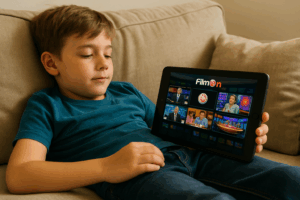In a candid family conversation addressing the themes of Netflix's *Adolescence*, a teenager and his concerned parents navigate topics such as misogyny, cyberbullying, and the impacts of social media on young people's relationships. Through their dialogue, the pressing need for open communication and better role models is highlighted, urging collective responsibility among families, schools, and tech companies.
Conversations on Cyberbullying and Misogyny: A Family's Response to Netflix's *Adolescence*

Conversations on Cyberbullying and Misogyny: A Family's Response to Netflix's *Adolescence*
As families grapple with the realities of teen social media usage, a thoughtful discussion emerges about the portrayal of complex issues in Netflix's *Adolescence*.
In Netflix's thought-provoking series *Adolescence*, the harrowing story of 13-year-old Jamie unfolds as he faces accusations of murder following exposure to lopsided online materials and severe cyberbullying. In a reflective conversation, 15-year-old Ben and his parents, Sophie and Martin, delve into the pertinent issues this show raises, particularly concerning their own family's dynamics around social media and sexuality.
"It's really uncomfortable discussing sexual feelings with parents," admits Ben, as the trio gathers in their living room to unpack the emotional layers of the show they recently viewed. The parents, both professionals in their 40s, resonate with Ben's apprehension while voicing their worries about the influence of online culture on their son’s behavior. They recognize parallels between the series' portrayal of teenage life and their own experiences navigating such themes with their son.
The family’s conversation shifts to Ben's perceptions of online terminology like "incel"—a label he's not familiar with but is explained by his father. While Jamie's experiences of misogyny mirror some of Ben's real-life observations, he feels that the dramatization might cater more to adult apprehensions than realities faced by today's youth, leaving out the beneficial aspects of social connectivity.
Amid these discussions, figures like Andrew Tate arise—once a phenomenon among Ben's peers, he is now considered "old news." Intrigued by Tate's mix of fitness advice with controversial viewpoints, Ben differentiates between his positive messages and toxic ideologies, prompting concerns from his parents about underlying societal issues reflected in this discourse.
The series tackles the complicated dynamics between young boys and girls, diving into a stark portrayal of miscommunication shaped by online influences. Sophie expresses concern about the disconnect in social skills among teens, emphasizing the need for more meaningful interactions beyond digital exchanges.
Threads of familiarity also run through narratives of shared intimate images leading to bullying, mirroring real incidents within Ben's community. Recognizing pornography's stronghold over his peers, Ben asserts its influence as one of the most pressing issues they face, further painting a picture of the harsh online landscape.
Amidst this sobering dialogue, Martin and Sophie emphasize the importance of cultivating self-esteem and providing well-rounded role models for their son, illustrating a proactive approach in combating the allure of toxic online cultures. They voice their commitment to ensuring that Ben enjoys opportunities beyond screen time, yet acknowledge the financial disparities that can limit access to such experiences in a broader context.
In closing their impactful conversation, the family calls for wider accountability among tech companies, educational institutions, and families—urging collective action to counter harmful narratives proliferating in the online world. For Ben, the distinction between online and real-life experiences blurs, insisting that what transpires in the digital space cannot be dismissed as trivial or irrelevant.




















